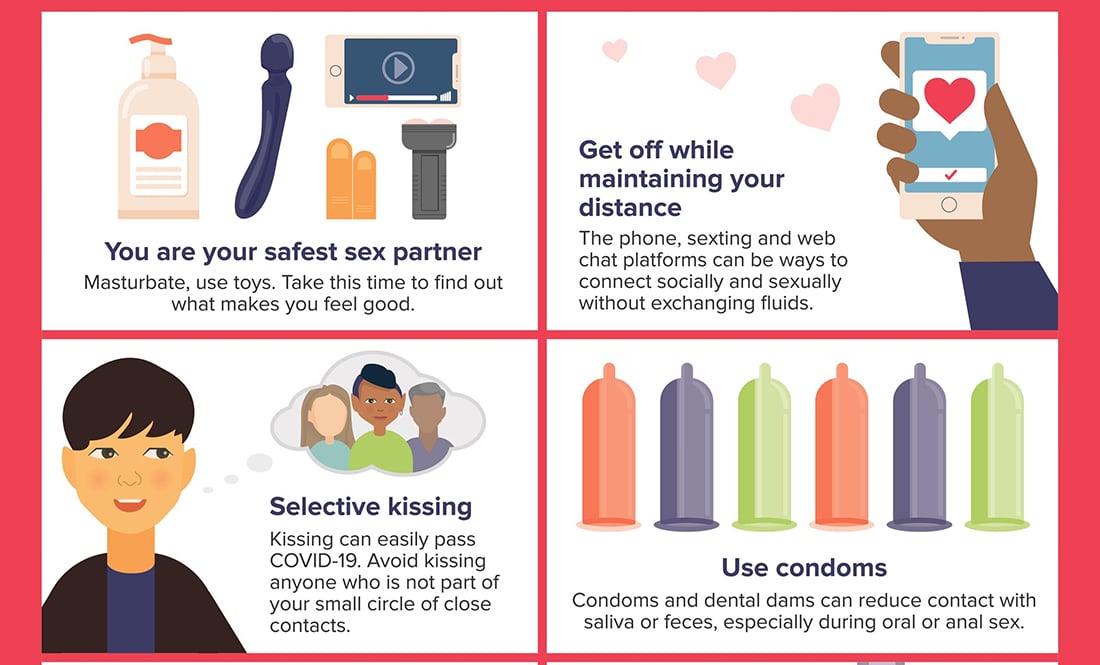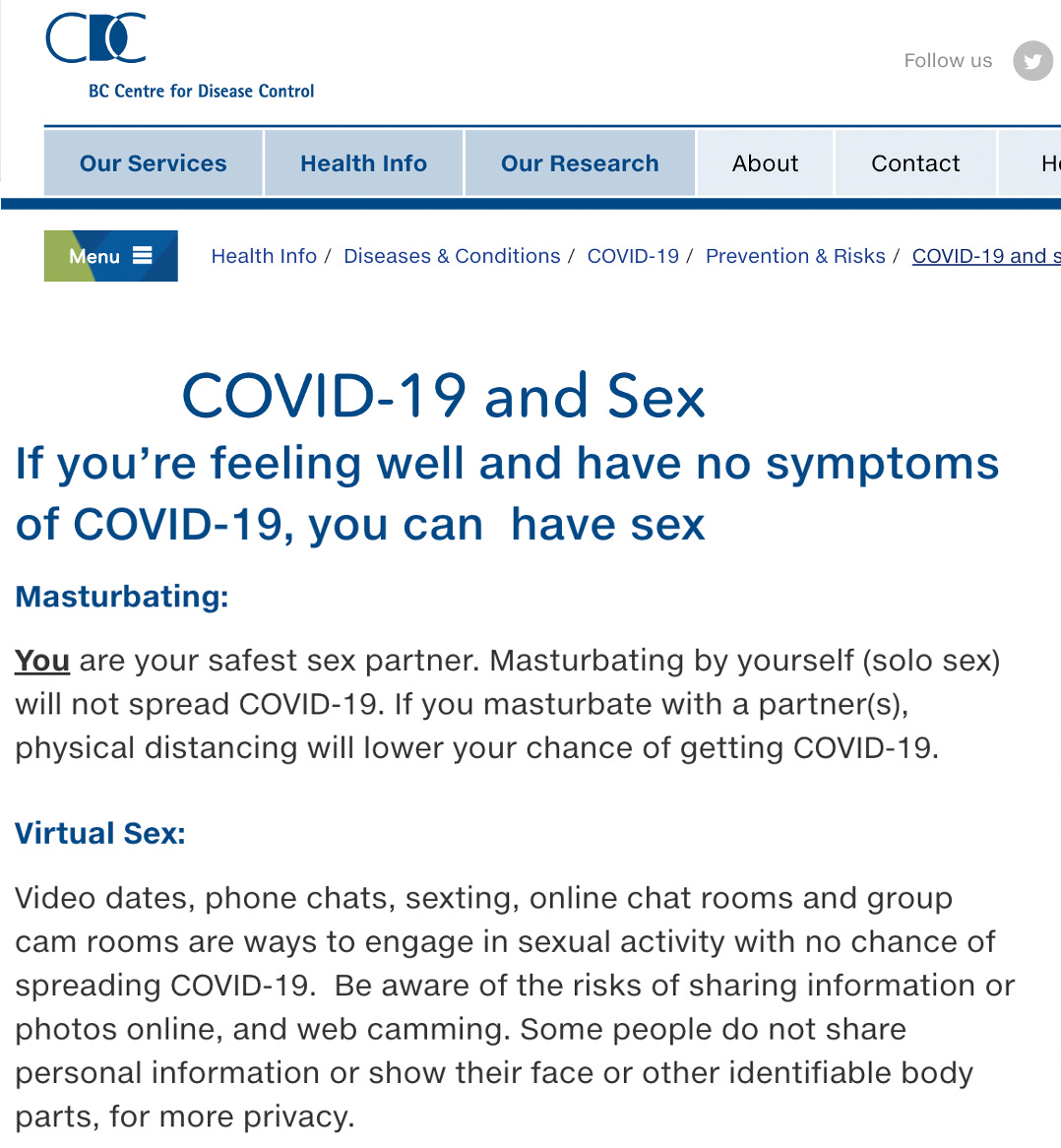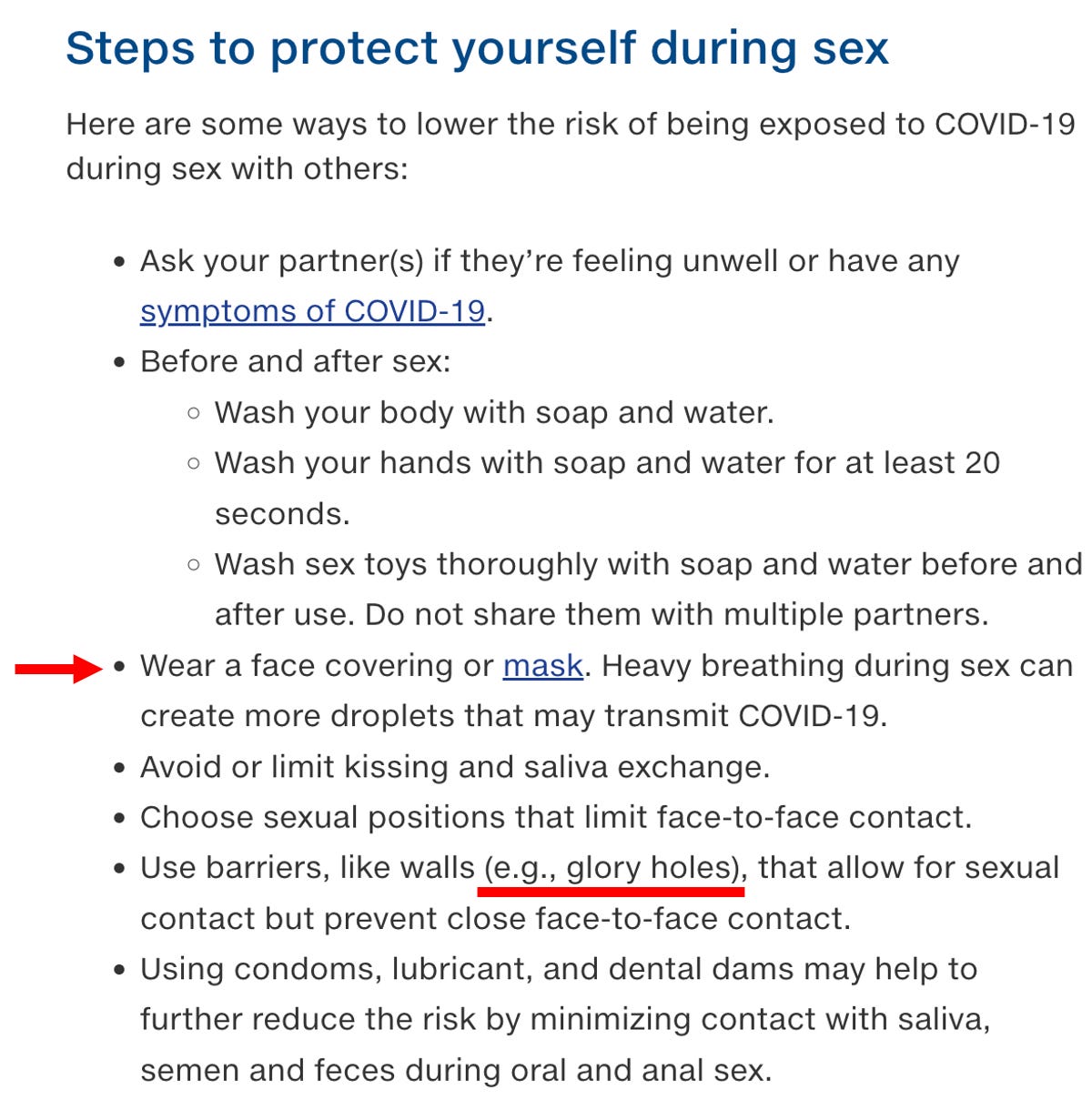

This is Real Advice from the CDC
by A Midwestern Doctor | Jun 17, 2022
Note: The text of this post is NSFW (Not Safe For Work) as the first half discusses explicit government guidelines (CDC) for sexual activities. If that is not a topic you do not wish to hear about, please disregard this article.
Two central themes have characterized the COVID-19 response:
•Obscene power grabs by public health officials who have no idea what they are doing but will take any chance at power.
•Attempts to rewrite social norms and cherished human experiences for the sake of that power grab.
Consider this article from the Washington Post
One of the most humorous examples came from a CDC in Canada:
At the time this happened, it was widely made fun of, and it was later pulled from their website (fortunately the internet archive never forgets). Incredibly, JP Sears made a satirical video on this concept that predated Canada’s guidelines. Because sexual intimacy is an integral part of the human experience, and government propaganda always circles back to fear and disconnection, instilling terror around this form of human connection has a recurring theme of “public health”.
One of the fascinating concepts you observe in evolution is how different species can evolve very similar features despite having no genetic connection to each other and living in different time periods. This process is known as “convergent evolution.”
Likewise, this process often occurs in human social systems and is why similar tyrannical structures beyond repeating in Western civilizations can also show up in isolated and disconnected societies.
The current dilemma the CDC is dealing with is that they need to hype up monkeypox to justify their annual budget to congress, but monkeypox is a non-issue except for a few rare instances of it being spread in unprotected group sex which involves tearing vulnerable tissue.
Today I saw recently posted guidelines from the CDC for monkeypox (remember this is the same clueless group that has arbitrarily published sacred guidelines that have dictated our lives for the last two years). I am honestly unsure if these represent an example of convergent evolution or the staffer who published this plagiarizing Canada’s guidelines without knowing what later happened to them:
Prior to these health guidelines, I had never heard the term virtual sex. It’s clear it’s a glamorized euphemism for talking to someone over a webcam…but honestly it comes off enjoying yourself with a virtual reality headset (which I’m sure Facebook has a business plan for). It’s interesting that both health departments used the same terminology, which likely means they both got it from the same place…wherever that might be.
Jokes aside, all this does touch upon a bunch more serious point. On many levels, the single most valuable aspect of the human experience is being alive and feeling your body. I would likewise argue that the underlying cause of much of the pervasive mental illness within our society specifically arises from us being disconnected from our bodies, our environment and those around us. Amongst other things, this is why exercise is can be more effective than (the often toxic) antidepressants for treating depression.
One of the truly insidious things that has been done by Big Tech has been to replace the experiences that make us human with virtual surrogates that are nothing more than mental ideas that can be easily monetized. Once you live in the realm of ideas you stop being human and instead live for your ideas. As a result, in individuals disconnected from their bodies, ideas mean everything, being wrong is often intolerable and this sad state of affairs characterizes much of today’s online discourse.
When you are actually with another human being, there is a profound degree of energy exchanged between each of you that can never be replicated virtually and is what creates the deeply meaningful experiences that make us human.
I often receive questions from commenters and subscribers over what they can do to change the minds of their friends and family who see things differently from them, particularly in this highly polarized environment. There is no easy solution, but I feel the issue is largely a product of becoming disconnected and polarized from each other, so if you can focus on reducing the polarization and becoming more connected with the other party, that is often the best place to change perspectives from.
For this reason, when I concluded the recent series on medical blindness and medical gaslighting, the fourth part focused on the politicization and polarization of the pandemic policies, while the fifth part focused on the best approaches I had come across to bridge this divide (illustrated through the lens of a doctor patient interaction). In some cases, if you really know what you’re doing (and the dialogue occurs in person), it is possible to change perspectives through wit and aggression, but in the majority of cases the only approach that can work is one that builds connection and creates the space for a mutual understanding to emerge.
Years ago, I saw this clip (specifically from 1:28 to 2:10) that I feel best synopsizes how to approach these situation. This entire sequence may be too New Agey for your tastes, so I have excerpted the relevant quotations below.
In our culture we’ve been trained for individual differences to stand out.
You look at each person and think, ‘Brighter, dumber, older, younger, richer, poorer’ and we make all these dimensional distinctions, put them in categories and treat them that way. And we only see others as separate from ourselves in the ways in which they are separate. One of the dramatic characteristics of the spiritual experience is being with another person and suddenly seeing the ways in which they are like you — not different from you.
Everything in our society has converge towards making people feel different from each other, disconnected from each other, and polarized towards each other. The tragic thing about all of this is that we (the 99%) share the majority of our values with each other, but the system continually antagonize us to identify with conflicting mental ideas so we can never come together as brothers and sisters.
I personally think one of the most evil things that Silicon Valley has done has been to usher in an era where many of us no longer feel and are completely disconnected from what actually makes us human. One of the particularly sad areas this has occurred in is with sexual intimacy and the proliferation of pornography.
There are a variety of different problems that are created by the widespread adoption of pornography in society. Beyond the widespread social ills it creates, pornography conditions people to transform sexual intercourse from a live physical experience to a conditioned mental idea.
As a result, for many individuals intercourse is transformed from an experience they feel throughout their body and a connection they share with another human being to a disassociated mental idea that has been conditioned to trigger a dopamine rush in their brain once they fulfill their preconceived concept of what the sexual experience should be. It’s really difficult for me to even begin to describe how much of being human is lost by existing within this paradigm, particularly since it is nearly impossible to experience the profound spiritual aspects of sexual intimacy if you cannot even be physically connected with yourself and your partner.
Nonetheless, Silicon Valley has done everything they can to make that become the dominant paradigm, and marketers took it as far as they could during the lockdowns (who knows, they might have even created the “virtual sex” for “public health” initiative as part of a PR campaign). As a result, we regularly saw public health officials directly encouraging individuals to have virtual sex rather than physical intimacy and consumption of pornography spiked during the lockdowns.
I was recently requested to complete an early review for Mattias Desmet’s The Psychology of Totalitarianism. Due to limited time, I normally turn these requests down, but given the importance of this work (Desmet was the one who coined the term “Mass Formation” frequently discussed by Robert Malone and Steve Kirsch), I chose to do so and am presently drafting that review.
One of Desmet’s central theses I strongly agree with is that when you have a society where everyone is disconnected from themselves and everything around them, it becomes dramatically easier to control a population and give birth to a totalitarian state. A significant portion of this disconnection is a direct result of our digital age encouraging us not to be in the direct presence of each other, but instead to reduce the human experience down to ideas and points of data.
I would also argue that when you have subtle damage to your nervous system (such as from poor quality processed food, poor sleep, environmental toxins reducing microcirculation necessary for proper nervous function or chronic inflammation within the nervous system from vaccinations), the ability to appreciate the subtle aspects of life drops off. As you become more dead inside, you gradually become receptive only to strong stimuli.
Many of these nervous system dysfunctions are permanent complications of injuries from a medical treatment. Others, such as sleep, can fluctuate on a day-to-day basis. Because some are easily changeable, I always find it fascinating to observe how my ability to experience the subtleties of life fluctuates on a day-to-day basis.
Pornography (and more violent sexual practices) is one example of where a complex subtle experience has been replaced with individual strong stimuli designed to elicit a conditioned dopamine response for individuals (which at its conclusion often leaves you feeling more dead inside than you did at the start). The same principle can also be observed throughout the mass media, a significant portion of the entertainment industry, and sadly even our society conditioned notions of “romance“.
Similarly, modern processed food emphasizes strong synthetic and addictive flavors fatigued tastebuds can overtly recognize. In contrast many traditional cuisines outside the reach of the processed food industry utilize a variety of more subtle flavors that form an incredible constellation of taste many industrialized tastebuds barely can even recognize. I have repeatedly observed that the preference between these two styles of cuisines is a direct reflection of the current life within one’s nervous system.
In summary, I hold the firm conviction the solution to many of our social ills is to become more alive inside so that we can become more connected to the people and environment around us rather than simply relating to the mental ideas they all represent. Similarly, one of my greatest fears is that we are moving into a transhumanist era where our species will largely loose the ability to feel.
In the coming days, I will further explore this theme as I delve into the global disconnection that Desmet argues sets the stage for Mass Formation Psychosis. Hopefully this was an enjoyable segue to a rather depressing topic.









0 Comments